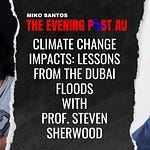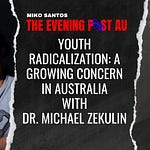ChatGPT is a powerful language model made by OpenAI. It can create text that sounds like it was written by a person, which means it can have natural language conversations.
This technology could change the way we use computers, and it has already started to be used in a number of different fields.
Teachers are worried that students will use the tool to cheat and plagiarise. As a result, some universities are rewriting exams, essay questions, and procedures to make sure students don't cheat.
Three states have already banned ChatGPT in public schools: New South Wales, Queensland, and Tasmania. Next week, the Education Department of Western Australia will decide whether to do the same, in time for the start of the school year.
In this episode, we talk with Professor Cath Ellis of UNSW about the ChatGPT and its impact on the current academic landscape.
Cath Ellis is a Professor in the School of the Arts and Media. She is the Faculty Student Integrity Advisor.
From 2014-2020 she was Associate Dean (Education) in the Faculty of Arts and Social Sciences and then until 2021 was Associate Dean (Education) in the Faculty of Arts, Design and Architecture.
Prior to that she was the Director of Teaching and learning in the School of Music, Humanities and Media at the University of Huddersfield in West Yorkshire, UK and a lecturer in English at the University of Wollongong in Australia.
In response to the release of ChatGPT, an online tool called AICheatCheck has already been made that can find content made by artificial intelligence.
It uses its own artificial intelligence models to figure out if a piece of text was written by a person or a machine by looking at the words used and the way the sentences are put together.
Meanwhile, a new book by an expert at Charles Darwin University (CDU) says that the growing use of Artificial Intelligence (AI) by students has caused a crisis that threatens the integrity of education.
In his book, Artificial Intelligence and Learning Futures: Critical Narratives of Technology and Imagination in Higher Education, CDU AI expert Dr. Stefan Popenici looks at the dangers of AI in education and curriculum design, which he has called a "global crisis" that is getting worse.
The book, which was published by Routledge, talks about the ideological history of AI development, the dehumanising effects of AI on universities, teachers, and students, and how providers need to rethink how they can use this technology in a positive way.
Dr. Popenici said that when he first started writing his book, his worries about how AI would affect education were criticised. However, recent events like the use of the AI programme ChatGPT to write university tests have shown that we need to rethink the role of AI in education and how we think about education in general.
"It's gone global. It's not just a problem in Australian universities or in the Anglo-Saxon world. "It's happening everywhere, in different languages and cultures," Dr. Popenici said.
Dr. Popenici said that one of the worst things AI has done is make students less interested in learning, being original, and being creative.
Dr. Popenici said, "AI is going to be a big part of our lives, so we need to change the way we teach."
"We should be very worried about letting things made by AI pass as valid tests. Our tests are so simple and stereotypical that a student can pass with no trouble, even if they use an engine that can't figure out what words and information from the Internet mean.
"We should think about how we can get back to being humans and how we can use this technology to help people learn more.”
"We need to figure out how to use AI for our own good instead of using it to destroy ourselves."
Routledge sells the book "Artificial Intelligence and Learning Futures: Critical Narratives of Technology and Imagination in Higher Education."
Before you go..
You can get RedWires AU for free right now. Your donation, no matter how big or small, will help us keep doing honest journalism.
The readers of Redwires AU are the engine that drives our publication. Add your support to the effort to create a sustainable future for journalism that does not make compromises in the AU.
In the world we live in now, accurate and thorough reporting and analysis are becoming more and more important. To stop the spread of false information, it's very important that everyone in Australia has access to good reporting.
The Redwires AU contributes to society by opening up access to information and resources for all people, rather than just a select few.
Our only goal is to educate the general public more thoroughly. If you believe in what we're trying to accomplish here, please consider making a contribution right away to ensure our success in the years to come.
Upgrade your subscription to get the most out of it. Join the growing number of people around the world who believe in the power of independent media.
Thank you
Miko Santos























Students could cheat on the test with ChatGPT, and here's what the expert says